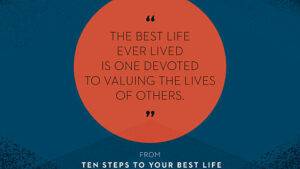Ten Steps to Your Best Life

We are excited to kick off our November Blog Series with Brent’s newest book, 10 Steps to Your Best Life. For the next four weeks, you will get a sneak peek of the first of ten steps that Brent outlines that equip and prepare us to live our very best life, one that has Jesus as the center and equips and prepares us to fulfill His calling and purpose on our lives.
This week, we will begin at the beginning – Step 1: Create a Rhythm of Renewal
There is something very human about longing for a fresh beginning. I have experienced this on a very personal level. Beginnings are full of hope and possibility. The beginning is devoid of my past, which is littered with mistakes. It doesn’t have a picture gallery of bad memories on constant display in my brain, and my emotions haven’t devolved to a place of cynicism masked as criticism. Beginnings are pure and untainted. Beginnings provide a fresh canvas just waiting for the masterpiece to be revealed.
The beginning of any journey or process serves as both a starting point and a reference point. The inauguration of anything worth doing will also function as the foundation throughout the process of any endeavor. In our case, we are suggesting that our beginning allows us to start something new, it affords us the sacred opportunity to adopt a new way of thinking . . . a new way of living. This scope and sequence, this practical guide for your best life, has been tried and tested and approved by the highest authority in the universe. It cannot be overstated that this is NOT simply a way of living. Rather, this is THE definitive manner in which we are to conduct ourselves, if we want our best life to be the end result.
Beginnings Are Important
And so, it is because of this that our discussion begins with God, who after all, begins his story with “in the beginning God” (Gen. 1:1). A purpose-filled scope and sequence of a life worth living must begin with the author of that life. For all humans, the author of human life is God. The psalmist explained it this way: “For it was you who created my inward parts; you knit me together in my mother’s womb. I will praise you because I have been remarkably and wondrously made” (Ps. 139:13–14). God would also explain to the prophet Jeremiah that his future existence was known before he was ever conceived. In other words, God chose and knew Jeremiah before his conception. I mention the psalmist and Jeremiah here to make a very simple point: our humanity was God’s idea, he knew of us from eternity past, and thus our lives are sacred to him. If humanity was God’s idea, then life itself is sacred and miraculous. Our beginning is sacred. Knowing your beginning point offers clarity, confidence, and comfort for the process ahead. How often do we know something is wrong or unhealthy or broken but lack the understanding of “how did I end up here?”
What if I told you the place we designate as “beginning” is actually the place that God wants us to put down roots and live. What if the beginning was really the destination? The greatest of all discoveries is the opportunity to find residence in the place of hope and potential, a beautiful space where fear and shame are irrelevant, a place where the future is as glorious as one can imagine. The place of beginning is God’s best for us in this life. You see, God doesn’t wait to give us his best, but he does wait until we are ready to receive his best. God is patient, wanting us to arrive to the place of beginnings. God’s best is God’s love toward a people who never asked for his love in the first place. Yet in our rebellion, he took the initiative to pursue us. And in his pursuit of us, we see the most loving act.
The most loving act,
God’s best for us,
the great initiative toward a people who so easily forget,
is Jesus on the cross.